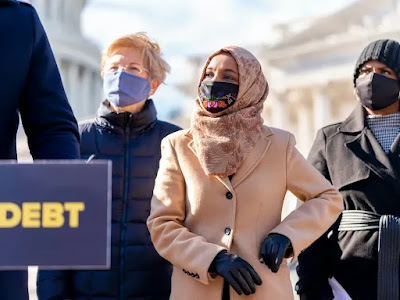Our government spent trillions of dollars responding to COVID, and just about everybody got a little something from Uncle Sam. Sometimes I think my wife and I are the only people in the United States who didn't get a COVID relief check.
For example, 14,000 law firms got Payroll Protection money, ostensibly to help them avoid laying off lawyers during the COVID crisis. Eleven firms got $10 million each, but all 14,000 firms got at least $150,000.
Prisoners also got some COVID cash. More than a half-million incarcerated individuals got three-quarters of a billion dollars in stimulus checks.
Even drinking establishments managed to get their noses in the trough. Hooters of Louisiana, a "full-service restaurant," got $156,000.
In short, the U.S. government has been spewing out COVID cash like a drunken sailor on shore leave. So why not forgive all student-loan debt--all $1.7 trillion?
After all, student-loan forgiveness makes more sense than handing out Payroll Protection money to professional athletes and politicians.
Wiping out all student-loan debt would benefit 45 million student borrowers, giving them extra cash to put into the American economy. That's got to be a good thing.
Moreover, many student debtors took out loans to get college degrees that are worthless to them. Maybe they attended one of the dodgy for-profit colleges where they paid too much for a mediocre educational experience. Perhaps they borrowed $100,000 to get a gender studies degree from an elite college--a degree that did not lead to a good job.
So--you can put me down as a supporter of total student-loan forgiveness. That's right; let's wipe out everybody's federal student-loan debt.
But we should recognize the perils of this course of action. First of all, student loans constitute the largest category of federal assets. If those loans disappear from the nation's balance sheet, the government's fiscal situation will look bleaker than it already does.
Secondly, we should recognize the moral hazard of wholesale student-loan forgiveness. People who take out student loans in the future will likely do so with the expectation that the feds will eventually forgive the debt. Thus, they may conclude they can default on their loans with no penalty.
Finally, wiping out all student debt does nothing to pressure colleges to get their costs under control. The higher education industry will continue raising tuition rates, forcing future students to take out more student loans to finance their studies.
In conclusion, I support student-loan forgiveness. Nevertheless, wholesale loan forgiveness will not solve the student-loan crisis. Until higher education cleans up its act and reduces costs, future generations of colleges students will continue getting hammered with unmanageable college-loan debt.
 |
| Thanks for the PPP money! |






